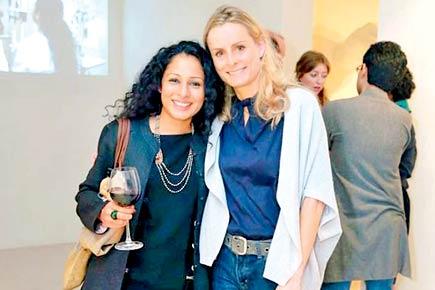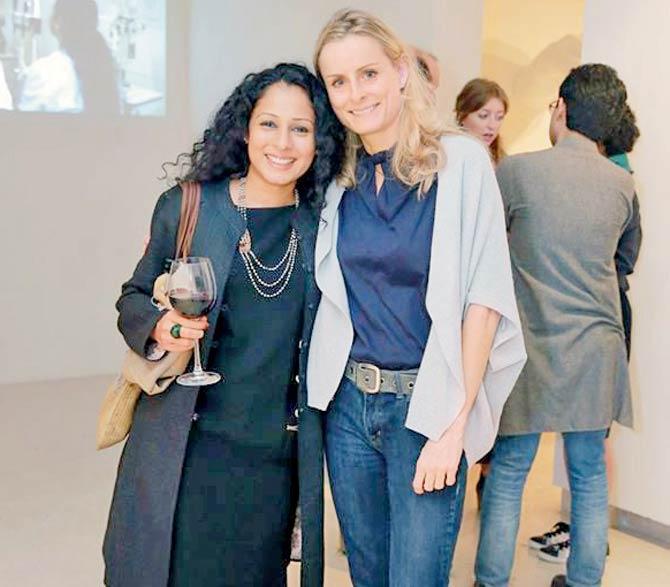She was a strong, independent woman who chose to live against the rules and build her own future. She was someone I was getting to know


Perfumer Monika Ghurde and fashion editor Iona Fergusson at the Nature Morte gallery in Delhi in November
ADVERTISEMENT

Monika and I had frequently discussed the prospect of collaborating. She wanted me to help her with some writing around new scents she was brewing; in exchange she’d create a unique perfume that personified me. But life got in the way. My book got in the way. She came to two of my book launches, though — in Goa and in Mumbai — and she made it a point to call me if she was ever in my hood in Delhi.
I remember so distinctly the night we first met, two years ago, during the opening week of the Kochi-Muziris Biennale. It was a dry day, an artist friend had some whiskey he didn’t want to take back to Delhi. When I met him, he was sitting at a table with Sissell Tolaas, a fabulous Norwegian artist known for her work with odours, most notably with recording the European experience of sweat, and beside her was Monika the perfumer, one of the most stunning women I’d ever meet. What an exquisite pairing of proclivities!
I waltzed through security on Saturday morning, but my flight to Delhi was delayed. My closest male friend then called. He was fuming because I’d dialled him by mistake last night when I went to meet some friends for a drink because I felt too traumatised to be alone. All he heard were random sounds and he didn’t receive the messages I had sent later. We were both reeling from the tragedy, and naturally we used each other as punching bags. That’s when the floodgates were drawn open and I found myself weeping uncontrollably to the obvious dismay and confusion of everyone around me in the waiting area. During a rare lull in my breakdown, I decided to distract myself from the rage I was feeling and find out if any efforts were being made to nab her murderers. That’s when I found Shangvi’s supposed tribute. One sentence stuck out, leaving behind the foul stench of hypocrisy, ensuring a fresh wave of hot, helpless tears. “Ghurde and I were not friends although we were friendly; her social ambitions scared me, and I must have seemed aloof to her, certainly I never made it my business to be liked.”
It alarmed me to think that a daily should commission someone who, by his own admission, didn’t know Monika well enough to write her obituary. But what saddened me more was his confession: “Her social ambitions scared me” — it made her seem like some sort of opportunist, which, coming from a true opportunist, made everything about her career and her aspirations seem sordid. Why is it that when men promote themselves they are viewed as well-networked, but when women, especially single women, do the same, they are perceived to have potentially frightening “social ambitions”? Even though, to be fair, Shangvi speaks of how, “after the dissolution of her marriage to a kind, older man, she had established herself as a perfumer, one of the first in India, she was coming into her own, she was taking risks, she was winning,” this passing remark smacks of a patronising attitude; an unfortunate pairing of clauses, as if the dissolution of her marriage had to inevitably precede her coming into her own.
As much as I mourned the utterly tragic and cruel manner by which Monika was taken away from us, I also found myself grieving for the shamefully sensationalist manner in which the news of her murder was circulated. What punctuated the loss was the horrible knowledge that it could so easily have been me, or any one of my many single women friends whom I consider an extension of my family of dearest friends. This crime was targeted as much at Monika as it was at the demographic she represented: strong, independent women who chose to live against the rules and build their futures alone. Her social ambitions were the same as mine — to make a name for yourself, to earn your seat at the table, to claim your rightful share of everything you know you deserve, to seek out the company of the very best because that is what you yourself want to be.
Deliberating on the life and times of Everywoman, Rosalyn D’Mello is a reputed art critic and the author of A Handbook For My Lover. She tweets @RosaParx. Send your feedback to mailbag@mid-day.com
 Subscribe today by clicking the link and stay updated with the latest news!" Click here!
Subscribe today by clicking the link and stay updated with the latest news!" Click here!






